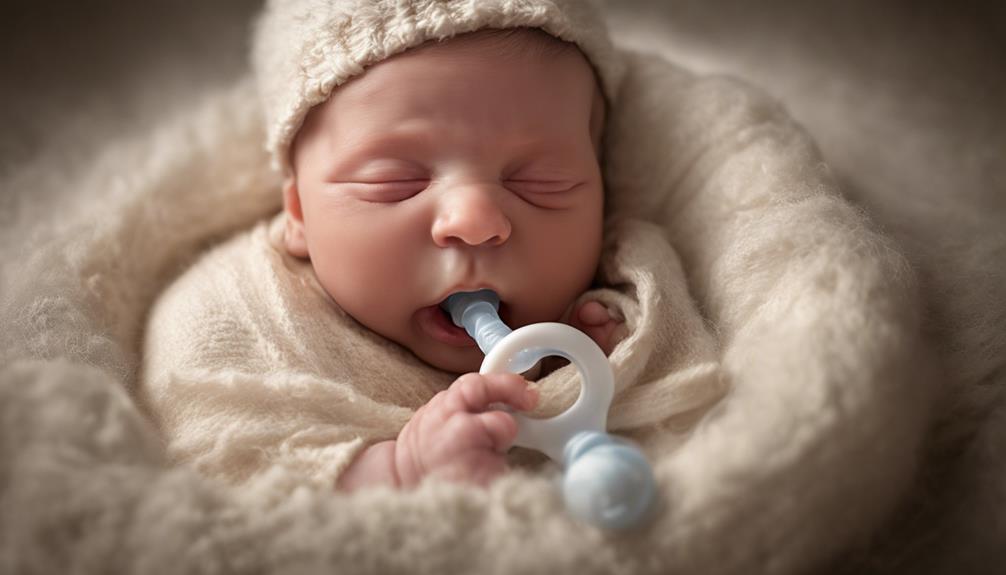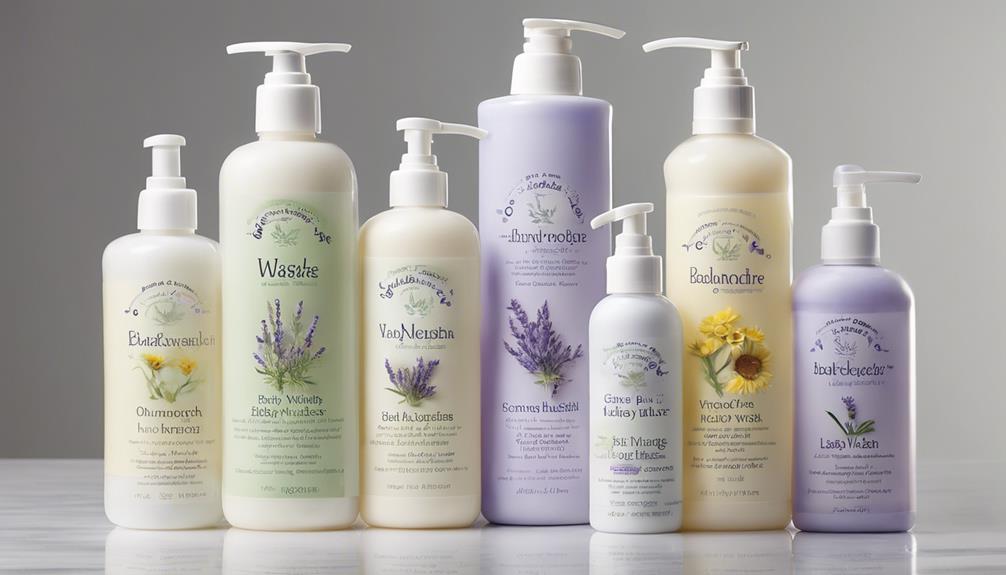Congratulations on the arrival of your little bundle of joy! It looks like those adorable hiccups have become a part of your daily routine.
Wondering how to bid them farewell? Well, fear not, as we've got a few tricks up our sleeves that might just help you put an end to those pesky hiccups.
Stay tuned to discover some simple yet effective techniques that could bring relief to both you and your little one.
Key Takeaways
- Minimize hiccups by burping frequently during feedings.
- Use pacifiers to relax newborns and stop hiccups.
- Adjust baby's position to release trapped air and alleviate hiccups.
- Employ gentle belly rubs to soothe and comfort newborns experiencing hiccups.

Philips Avent Soothie Baby Pacifiers – 100% Silicone Pacifiers for Babies 0-3 Months, One-Piece Design, BPA-Free, Extra Durable, Green, 4 Pack, Model SCF190/41
Newborn pacifier 0-3 months supporting baby’s natural suckling need: designed to fulfill newborns' natural suckling reflex to self-soothe…
As an affiliate, we earn on qualifying purchases.
As an affiliate, we earn on qualifying purchases.
Burping Techniques
To minimize hiccups in newborns, it's important to practice regular burping techniques during and after feedings. When feeding your baby, whether through breastfeeding or bottle-feeding, air can get trapped in their stomach, leading to discomfort and hiccups.
By burping your baby every 2–3 ounces during bottle feedings or when switching between breasts during breastfeeding, you can help release the trapped air and prevent hiccups. Proper burping techniques involve holding your baby upright against your chest or placing them over your shoulder and gently patting or rubbing their back. These actions help the air bubbles move up and out, reducing the chances of hiccups.

Maliton Muslin Baby Burp Cloths 6 Pack Large 20''x10'' 100% Cotton Burp Rags Absorbent and Soft 6 Layers Muslin Cloth Baby Essentials for Newborn(Animals and Cars, Pack of 6)
100% Cotton Material-Made of pure cotton muslin, Maliton Baby Cotton Burp Cloths are soft and breathable, the fabric…
As an affiliate, we earn on qualifying purchases.
As an affiliate, we earn on qualifying purchases.
Pacifier Use

Using a pacifier can effectively relax the diaphragm muscle in newborns experiencing hiccups. The sucking action on a pacifier may stimulate the vagus nerve, potentially aiding in stopping hiccups in babies. It provides a gentle and safe way to soothe newborns and reduce hiccups. The pacifier's sucking action can distract the baby from the hiccups, helping in their resolution. This method is gentle and safe for your little one.
When your newborn has hiccups, offering a pacifier can be a comforting way to help them relax. The gentle sucking motion not only distracts the baby but also stimulates the vagus nerve, which may stop the hiccups. It's a simple and non-invasive method to soothe your baby and reduce their discomfort. Using a pacifier is a safe way to calm your little one and aid in resolving those pesky hiccups.

Bright Starts Hug-a-Bye Baby Elephant Stuffed Animal Musical Toy, Soft Toy Soother Plays Songs & Lights up, Newborn and up
Snuggly soft soother for hugs as big as an elephant!
As an affiliate, we earn on qualifying purchases.
As an affiliate, we earn on qualifying purchases.
Changing Positions

When soothing your newborn's hiccups, consider adjusting their position to help alleviate discomfort and aid in stopping the hiccups. Changing the baby's position can be beneficial in relieving trapped air bubbles that may be causing the hiccups. Try holding your baby upright or placing them in a slightly inclined position while supporting their head. This adjustment can help reduce the pressure on the diaphragm, potentially easing the hiccups.
Additionally, gently rocking your baby or placing them on their tummy may help relax the diaphragm and stop the hiccups. Alternating between sitting and lying down positions can also assist in alleviating hiccups by shifting the trapped air. Experimenting with different positions like gently bouncing your baby in your arms could aid in stopping the hiccups.

Cococu Baby Head Pillow Upgraded Flat Head Pillow, Baby Neck Support for Carseat Soft and Breathable Ergonomic Design, White
Upgraded Ergonomic Design: Specially contoured to cradle your baby's head, this pillow helps prevent flat head syndrome while…
As an affiliate, we earn on qualifying purchases.
As an affiliate, we earn on qualifying purchases.
Gentle Belly Rubs

If your baby's hiccups persist, consider gently rubbing their belly to help relax their diaphragm and potentially stop the hiccups. Here are some tips to guide you through using gentle belly rubs:
- Clockwise Motion: Rub your baby's belly in a clockwise motion to aid in releasing trapped gas that could be causing the hiccups.
- Gentle Pressure: Applying gentle pressure while rubbing the belly can provide comfort and relief, soothing your little one during hiccups.
- Promote Relaxation: Belly rubs can promote relaxation, helping your baby breathe more calmly and ultimately reducing hiccups.
- Soothing Relief: Consistent and gentle belly rubs are a soothing and effective way to address newborn hiccups, offering your baby the comfort they need.
Feeding Adjustments

To help alleviate newborn hiccups, consider making adjustments to your baby's feeding routine. Burping your baby during and after feedings can release trapped air, reducing the chances of hiccups. Feeding smaller amounts more frequently can prevent overfeeding and excess air intake, which are common triggers for hiccups.
Ensuring a proper latch while breastfeeding is essential as it helps minimize the intake of excess air, decreasing the likelihood of hiccups. Keeping your baby in an upright position for 20-30 minutes after feeding can aid digestion and reduce hiccups.
Using paced bottle feeding techniques can also be beneficial in controlling the milk flow, preventing your baby from gulping air and experiencing hiccups. These feeding adjustments, along with proper burping, an upright posture, and a correct latch, can work together as a digestive aid, helping your baby to feed comfortably and reducing the occurrence of hiccups.
Frequently Asked Questions
How Do I Relieve My Newborns Hiccups?
To relieve your newborn's hiccups, try burping, changing feeding positions, offering a pacifier, or gently rubbing their back. Let hiccups pass naturally in 5-10 minutes. Trust your baby's body to self-regulate, but these tips can help ease discomfort.
Is It OK to Lay Baby Down With Hiccups?
It's perfectly fine to lay your baby down with hiccups. Hiccups are usually harmless and resolve on their own. Monitoring your baby is key. It can be comforting for them. Hiccups typically stop soon.
What Is the Best Position for Baby Hiccups?
When your newborn has hiccups, cradle them against your chest or on a slight incline on your lap. Support their head and neck, avoid laying them flat, and gently pat or rub their back to help stop the hiccups.
What Stops Hiccups Quickly?
To stop hiccups quickly, try burping, changing positions, offering a pacifier, or gently rubbing your baby's back. Let hiccups resolve naturally within 5 to 10 minutes. These simple steps can bring your little one comfort and relief.
Conclusion
To summarize, there are several effective ways to stop newborn hiccups such as:
- Burping
- Using a pacifier
- Changing positions
- Gentle belly rubs
- Making feeding adjustments
Remember, newborn hiccups are common and usually harmless, but if they persist, seek medical advice.
So, why not try these simple methods to help your little one find relief and comfort? Your baby's well-being is always a top priority.









